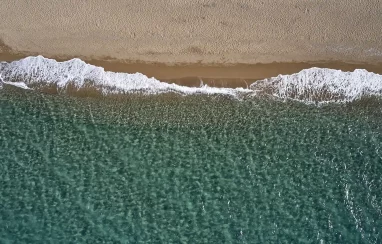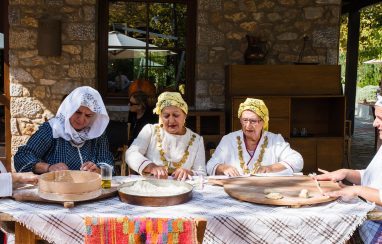By Thanassis Christou, Professor of Modern and Contemporary History at the University of the Peloponnese
Edited by Paulina Björk Kapsalis
Something is stirring in Messinia this week. On this westernmost “finger” of the Peloponnese, and particularly in the coastal town of Pylos, the locals are preparing for a unique and revered celebration: the anniversary of the Battle of Navarino – one of the last major naval battles in history to be fought only with sailing ships.
The events that mark the occasion draw visitors from near and far to join in the many festivities. As the week unfolds, Pylos’ central square becomes the stage for a cultural spectacle. It all reaches a crescendo on the evening of October 20th, with a spectacular reenactment of the battle that took place 196 years ago, which can be seen from any spot along the water, and lights up the sky. While there is certainly an air of joy, on Thursday and Friday, memorial events for those who perished are also on the agenda– an important reminder that history is more than stories. For locals here, and for the rest of Greece, the Battle of Navarino changed the world.
So, what was it all about? What was the Battle of Navarino, why did it happen, and why is it important? Thanassis Christou, Professor of Modern and Contemporary History at the University of the Peloponnese, has the answers:
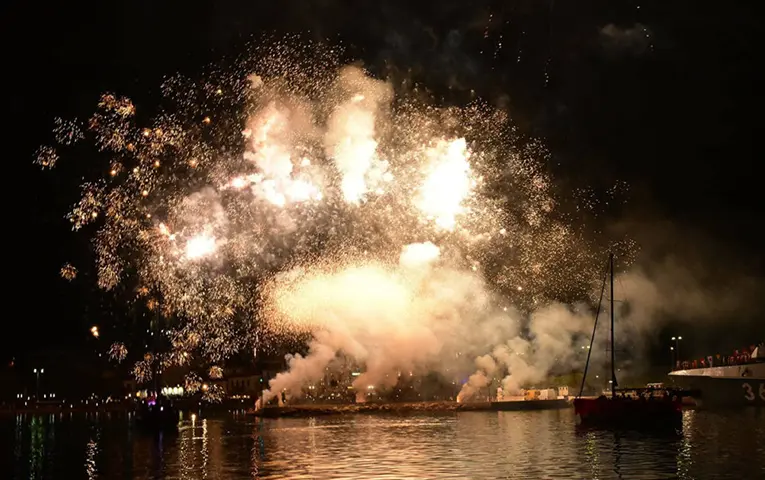
Why was there a battle at Navarino?
On July 6, 1827, the Treaty of London was signed by Great Britain, Russia and France. It mainly restated the terms of the Protocol of St Petersburg (April 4, 1826), while its preamble referred to the need to safeguard trade in the south-east Mediterranean, the Greek petition to the British and French for protection, and the dominance of a humanitarian spirit in the wider region.
Specifically, the three contracted powers demanded that the Ottomans and the Greeks conclude an armistice. If that term was accepted, they would immediately commence negotiations with the two adversaries in Constantinople/. The Greeks would pay tribute to the Sultan, but would gain their autonomy. The borders of the emerging state would be at the center of negotiations not only with the Ottoman Empire, as provided for in the protocol, but also with the two fighting parties.
The Treaty of London also had “a supplementary and secret article” which later developments showed to be of particular importance. The specific article defined the means by which the adversaries, and primarily the Ottomans, would be coerced into falling in line with its terms.
What happened at the Battle of Navarino?
At 2 o’clock in the afternoon on October 20th, 1827, the Allied fleet entered the narrow bay of historical Pylos in a united show of strength, creating an impressive atmosphere of silence and expectation in the cove.
The curtain had now risen on the crucial Battle of Navarino, which would shortly and more specifically at 2.25 pm, astonish not only its protagonists, but also people throughout Europe, who were waiting with bated breath for the newspapers to report the latest details of the desperate struggle of the Greeks, whose many developments were astonishing the global community at the time.
The entire battle, from beginning to end, consisted of repeated individual engagements of ships in a chaotic and deadly struggle, bolstered by mutual support but also weakened by friendly fire. All this took place in an enclosed bay, in which 90 Ottoman and 27 Allied warships would not easily have been able to maneuver even under peaceful conditions, not to mention the transportation ships, which were kept under constant pressure and fired upon ceaselessly, creating a truly hellish atmosphere.
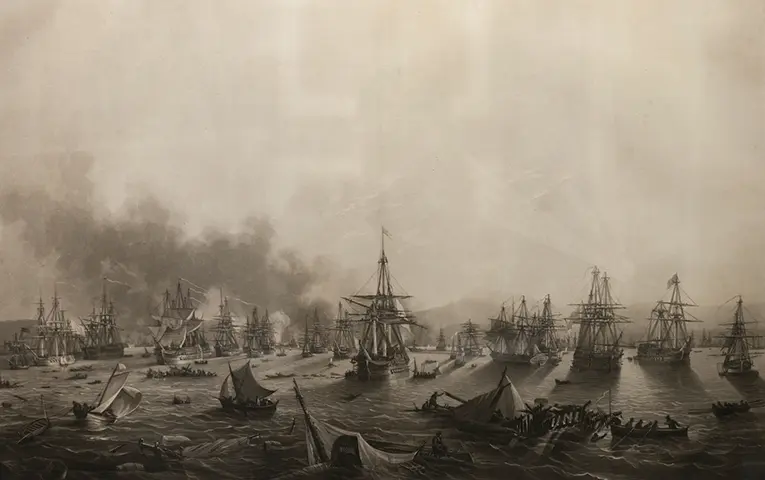
How did the world react?
The news of the Battle of Navarino was published in the “General Newspaper of Greece,” which noted: “At present/ on 8 to month, we have heard from Spetses that last Saturday there was a heavy cannonade in the direction of Neokastro [a castle on one side of Navarino bay], and it is concluded that the allied fleets hit the Turkish fleet there,” while lower down on the same page it reports, “We are informed by letter from Spetses and Arkadia that the Turkish-Egyptian fleet at Neokastro was utterly destroyed by the Allied fleets of the three mighty powers.”
Unsurprisingly, the Allies’ victory at Navarino triggered a wave of enthusiasm and emotions among the Greeks, who now began to see the path of liberation opening up before them more promisingly than ever. In memoirs and eye-witness accounts, contemporaries immortalized this victorious battle in the War of Independence in glorious and optimistic terms.
Following the departure of the protagonists from the theatre of operations, a large public debate ensued over the conducting of the battle, its underlying causes, and its impact on European public opinion. Various views were expressed. It can be mentioned indicatively that the Turkish fleet was “dispatched at anchorage,” for example, or that the Ottomans were the first to open fire but only in legitimate defense, or even that the battle was unexpected and that the Turks and Egyptians were caught unawares. However, irrespective of all these arguments, what was most important was that instead of abiding by and implementing the Treaty of London, which they had signed, the Ottomans had continued in their excesses and breaches of faith, provoking the Allies and leaving them with no choice but to employ violence and engage in conflict.
The battle, which in four hours proved decisive for the independence of the Greek revolutionaries, was welcomed by the people of Europe, who almost immediately perceived a shift in the balance of power between themselves and the institution of absolute monarchy, which was at its height in Europe at that time. This positive view of the event on the part of the public was not reflected in the stance of every European government, which, serving vested interests and expediency, saw that the compromising of Ottoman territorial integrity would mean a significant shift in the balance of power.
Paris and Petersburg hailed the victory of their fleets with enthusiasm. The French, the creators of the Egyptian fleet, felt great satisfaction in the contribution of their navy in such an important encounter, since in their last engagement, that of Trafalgar (1805), they had been humiliated and defeated. The Russians also felt vindicated because they had stood by the British and French sailors as equal partners in an objectively difficult conflict.
Austria-Hungary adopted a negative attitude with Metternich suggesting that general chaos would follow after Navarino. In Great Britain, and especially in the conservative circles, the reception of the news was cold. The majority of the general public, of course, reacted with enthusiasm and joyous feelings, but there were some who considered that, with the defeat of the Ottoman fleet, a key barrier to the descent of the Russians into the Mediterranean had disappeared.
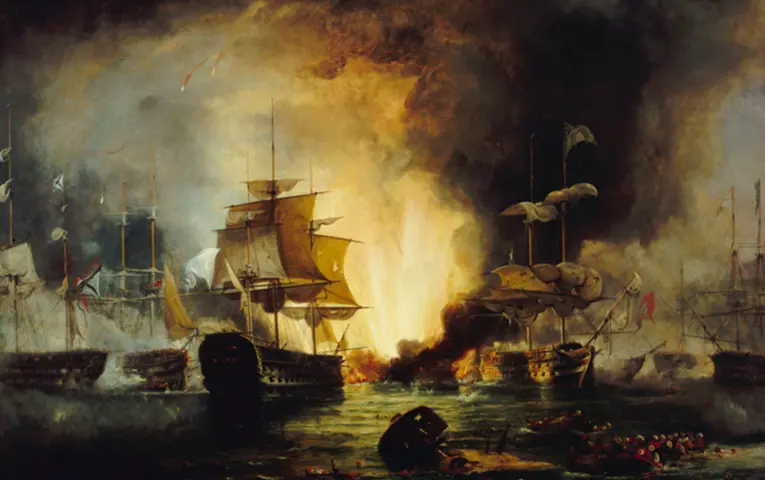
How did it change the world for the Greeks?
The Battle of Navarino on October 20, 1827, was a solid platform for the long and bloody efforts of the defiant Greek people to create a self-sustaining, autonomous and independent nation. The Allied squadrons under Codrington, De Rigny and Geiden, whose governments had created a diplomatic schism at the heart of the Holy Alliance with the signing of the Treaty of London on July 6, 1827, completed the conquests of civilized Europe at a military level. The united Allied fleets vigorously cut the Gordian knot of the Greek question at Neokastro.
As it was expected, this development intensified the acute British-Russian rivalry, resulting in the creation of an independent Greece being proposed at the negotiating table. This plan was elaborated and established at the London Conference with the signing on February 3rd, 1830 of the three protocols for the independence of the first Greek state.
[Photo credits: navarinia.gr]
